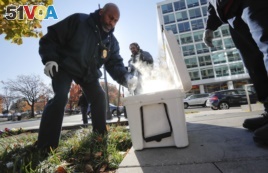17 December, 2018
Andre Pittman and Gregory Cornes are on a campaign to remove unwanted, often harmful creatures from Washington, D.C.
Their target is not corrupt officials or backroom political operatives. It is instead an animal: the common Norway Rat.
The capital of the United States is facing a growing rat population. Two of the reasons are mild winter conditions and growth in the city's human population.
Washington's government is struggling to keep up with the growing number of rats.
On one recent day, Health Department employees Pittman and Cornes work near the U.S. Capitol building. They put pieces of dry ice into suspected rat holes. Another day, they were sent north of the White House, where homeowners have reported rat sightings.
On the grounds of a religious center, the two men quickly find the holes where rats hide. Cornes uses a long instrument to inject poison into a hole. Pittman watches to see if poison comes up from other holes and then covers those holes with dirt.
At the office building next door, the men receive a warm welcome from the security guard.
"We... moved all garbage away from the door because that's where they would feed and party," says the guard. He added that the rats would run over the workers feet when they left the building at night.
Cornes says to him, "We're winning."

Pest Control Officers Gregory Cornes, left, uses a hand trowel to scoop-up dry ice before dropping it directly into rat burrows, as his co-worker Curtis Redman assist, near the Capitol building in Washington, Wednesday, Nov. 21, 2018. (AP Photo)
However, the numbers do not support his claim. The pest control company Orkin rates Washington as America's fourth "Rattiest City," based on the number of new service calls. It is just behind Los Angeles and New York City. Chicago has been No. 1 in each of the past four years.
While Washington does not have New York's famous super rats, evidence shows that the D.C. rats are on the march.
In September, an apartment building's fire alarm sounded, forcing people to flee for safety. A security camera video showed a rat pulling the alarm.
Back on Washington's M Street, Cornes and Pittman discover a number of holes in a large planter box in front of an office building. They inject poison, and the rats flee.
Gerard Brown is the head of Washington's rat control program. He says mild winters have helped fuel an increase in the rate of population. Cold winters do not necessarily kill the animals, but it cuts off their supply of food. During the winter, they stay warm by living in holes underground or under buildings.
Most Norway rats live only about eight months, but a full-grown female rat can give birth to 10 babies a month.
Washington is enjoying an expanding economy, and the city's population has been rising. The population just passed 700,000 — more than the U.S. state of Vermont or Wyoming. Brown said the number of restaurants, bars and coffeehouses has increased 25 percent in two years.
"More people with more money means more restaurants, which means more garbage, which means more rat food," Brown said.
In several ways, Washington is an ideal environment for rats. It is filled with large, green places. The animals also like the waterfront. Part of D.C.'s growth has resulted from development of areas along the Potomac and Anacostia Rivers.
Washington Mayor Muriel Bowser has given an extra $900,000 to increase rat control efforts. The government is also offering financial aid for restaurants to buy garbage compactors to limit the rats' food supply.
As rat expert Robert Corrigan says, "80 percent of any rat control campaign is actually (garbage) management."
Corrigan advises Washington and other cities on rat problems and provides free classes in Washington for both city workers and homeowners.
He says the solution is for the city to collect the garbage at night.
"The usual early morning pickup plays right (to) the rats, which are active all night long," he said.
Several city officials said this would almost be impossible to carry out because of employment issues and late-night noise concerns.
I'm Susan Shand.
The Assciated Press reported this story. Susan Shand adapted this story for Learning English. George Grow was the editor.
_________________________________________________________________
Words in This Story
garbage – n. things that are no longer useful or wanted and that have been thrown out
alarm – n. a signal or warning notice
compactor – n. a machine that firmly boxes wastes
management – n. the act of directing or supervising something